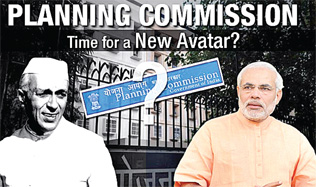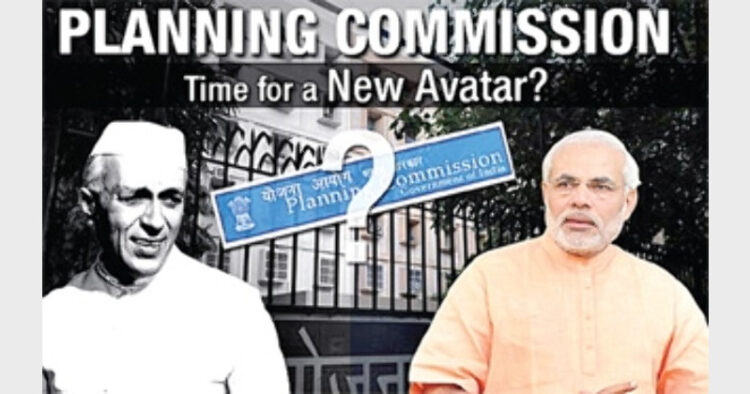Intro: A handpicked, five-member think tank, which will draw its power from Prime Minister Narendra Modi”s backing, is likely to replace the Planning Commission. ?
 The Planning Commission was established in the 1950s to draw a road map for the development of the country and to allocate resources to that end. There is a consensus that the latter role truly belongs to the Finance Commission and the Commission has wrongly abrogated that authority to itself. The only role of the Commission should be to draw a road map. Needless to say, this requires thinking.
The Planning Commission was established in the 1950s to draw a road map for the development of the country and to allocate resources to that end. There is a consensus that the latter role truly belongs to the Finance Commission and the Commission has wrongly abrogated that authority to itself. The only role of the Commission should be to draw a road map. Needless to say, this requires thinking.
The tragedy of the Commission is that it has mostly been staffed by non-thinking persons. IAS officials mostly behave like robots and change their tune according to whims of the reigning minister so that they can save their plum posts. They are trained mostly to follow instructions; not to think. Their thinking, if at all, is like the horse’s vision—limited by the flaps put in place by the Ministers. Such thinking can scarcely help make a road map for the country which essentially requires a critical assessment of past actions and the experiences of other countries. The same goes for professors working for salary. They mostly peddle ideas that are liked by the Ministers so that avenues for prominent postings are opened.
The Manu Smriti gives the name “dog’s tendency” to one who serves another. It matters little whether it is a one-star dog or a five-star dog. So every servant is fundamentally a non-thinking person. It is well known that he who pays the piper calls the tune. Indeed, these paid pseudo-thinkers can suggest minor tinkering with programmes such as changing the ratio of materials and labour components in Mahatma Gandhi National Rural Employment Guarantee Act (MNREGA). But suggesting a paradigm shift such as replacement of MNREGA with an employment subsidy programme is mostly outside the world view of these glorified subservients.
The result of staffing the Commission with such persons is there in plain view of all. In its Annual Report for 1991-92, the Commission sang praises of the achievements of the Seventh Five Year Plan that was implemented in 1985-90. All was well according to the Commission. Why then, did the Balance of Payments crisis of 1991 strike? Was it not the role of these “thinkers” to forewarn the Government of the impending danger? Or take the defeat of National Democratic Alliance (NDA) in 2004. Till the very end, the Planning Commission was happy flaunting false figures of crores of jobs having been created so that Prime Minister Vajpayee was kept in good humour. The Commission failed to warn the Government of the anti-people character of the policies that Vajpayee had implemented. Then again think of the recent defeat of the United Progressive Alliance (UPA). To my knowledge the Commission did not provide any input to the Government of the seething anger that had gripped the polity. The Commission was merely singing the tune told by Manmohan Singh.
The problem is not limited to India. The Council of Economic Advisors is appointed by the US President to provide guidance on economic issues. In 2006-07, the Council had highly praised the dismantling of controls on the US banking system. It said that the American banking sector had become globally competitive because of deregulation. The Council utterly failed to foresee the heavy leveraging that the banks had gone into and that a housing bubble was in the making. The reason behind such failures in India and abroad is that the so-called “thinkers” are appointed by the same Government whose errors and failures they are expected to highlight. A judge appointed by the thief can scarcely deliver justice. Similarly, a “thinker” appointed by the Government can scarcely take a critical view of the same Government.
Hence, the way forward is to change the system of appointment to the new avatar of the Commission as a Think Tank. Let the members of the Think Tank be appointed by a collegium chaired by the Leader of the Opposition that includes Minister of the ruling party as a member. Other members may include a judge of the Supreme Court and presidents of professional associations such as the Indian Economic Association and the Institute of Chartered Accountants of India. Let the collegium make public the names of the candidates and hold separate public hearings both for the Members of Parliament and the public. Appointments to key offices in the United States are confirmed by a Committee of the Senate which holds in camera hearings and brings in an element of transparency and gives legitimacy to the person who is appointed. We should institute such a process. This will remove the stranglehold of the reigning Government on the members of the Think Tank and enable the members to give true advice to the people of the country.
It has been argued that the Think Tank will lose its voice if allocation of resources is taken out of its ambit. I think the fear is misplaced. The National Human Rights Commission or the Comptroller and Auditor General of India have no executive power to implement their recommendations. These authorities only submit their report to the Parliament, whereafter the Government has the task to submit an Action Taken Report. Yet these offices have a huge voice. The proposed think Tank will enjoy a similar position.
PM as Head?
Intro: The nation is fed up with yes-men manning the important offices like Deputy Chair of the Planning Commission, Central Vigilance Commissioner, the Comptroller and the Auditor General etc. The need is to appoint independent persons to these posts. ? |
The Think Tank may place its evaluation of the Central Ministries and State Governments before the Parliament and the Legislatures and the government should then be required to place an Action Taken Report before the public. Let the Think Tank evaluate the welfare model of Kerala, backward caste upliftment model of Bihar, labour reforms model of Rajasthan and highways model of Maharashtra pointing out the strengths and weaknesses of these models. I feel, such a process will genuinely jump start a process of thinking in the nation.
The last question is that of accountability. To whom will the Think Tank be accountable? It cannot be made accountable to the reigning Government because it is the one to be evaluated. The possible way out can be to appoint Board of Directors akin to those appointed by business corporations. This Board may be chaired by the Prime Minister. Its members may be two Chief Ministers by rotation, the eldest Padma awardee, the youngest Olympic medal winner, and the likes. Once again the trick lies in taking the appointments out of the ambit of the reigning government while also making it transparent.
Also Read This : Economic Turnaround In 100 Days
The nation is fed up with yes-men manning the important offices like Deputy Chair of the Planning Commission, Central Vigilance Commissioner, the Comptroller and the Auditor General etc. The need is to appoint independent persons to these posts. This will be beneficial for the Government in power as well. Instead of being misled by yes-men as they were in 1991, 2004 and 2014; the Government will stand forewarned of the impending crises and get an opportunity to save its day.
-Dr Bharat Jhunjhunwala?(The writer is a former Professor of Economics at IIM Bengaluru) ?















Comments